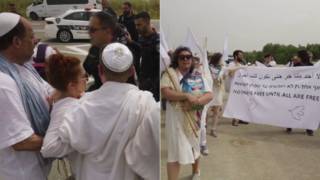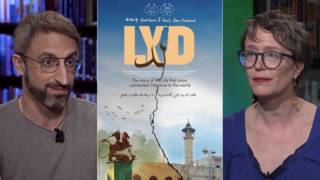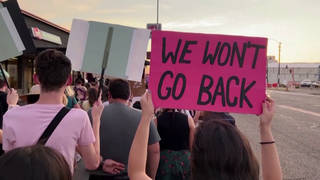
Related
Guests
- DeShawn TaylorOB-GYN physician and CEO of the only Black woman-operated abortion clinic in Arizona.
- Chris Lovespokesperson for Arizona for Abortion Access.
- Alejandra Pablosreproductive justice community organizer targeted by ICE for deportation.
In Arizona, Republican lawmakers have blocked efforts by Democrats to repeal an 1864 law — first written before women had the right to vote and recently revived by the state’s Supreme Court — that bans nearly all abortions under threat of criminal penalties including jail time. To respond, we host a trio of reproductive justice advocates in Arizona. Dr. DeShawn Taylor, an OB-GYN physician, abortion provider and the CEO of the only Black woman-operated abortion clinic in Arizona, emphasizes that her practice “will continue to provide abortions until we are made to stop,” but warns that in the future “abortions likely will not happen in Arizona because of those criminal penalties.” Meanwhile, organizers like Chris Love and Alejandra Pablos are fighting back. Love is a spokesperson for Arizona for Abortion Access, a coalition of reproductive rights organizations working to put a constitutional amendment on abortion on the state’s upcoming November ballot. The petition for the proposed ballot measure is still collecting signatures. “We know what we want, and we want people to have the care that they need,” concludes Pablos, who organizes for reproductive, racial and immigrant rights.
Transcript
AMY GOODMAN: This is Democracy Now!, democracynow.org, The War and Peace Report. I’m Amy Goodman, with Nermeen Shaikh.
NERMEEN SHAIKH: We turn now to the swing state of Arizona, where Republican lawmakers have blocked efforts by Democrats to repeal an 1864 law that bans nearly all abortions in the state. The move came a day after Arizona’s Supreme Court revived the 160-year-old law, approved before Arizona was a state and before women could even vote.
Vice President Kamala Harris is on a “Fight for Reproductive Freedoms” tour that will visit Tucson on Friday. The court issued its decision a day after Republican presidential front-runner Donald Trump said abortion should be decided by the states. Trump said Wednesday the Arizona ruling went too far.
AMY GOODMAN: We’re joined now by Chris Love, spokesperson for Arizona for Abortion Access, a coalition working to put a state constitutional amendment on abortion on Arizona’s November ballot. In Tucson, Alejandra Pablos is with us, reproductive justice community organizer who was targeted by ICE for her activism and faced deportation proceedings for over a decade. And in Phoenix, Arizona, we’re joined by Dr. DeShawn Taylor, OB-GYN physician, abortion provider, CEO of the nonprofit Desert Star Institute for Family Planning in Phoenix, Arizona, the only Black woman-operated abortion clinic in Arizona.
We welcome you all to Democracy Now! Dr. Deshawn Taylor, let’s begin with you. You’re a physician. The Arizona state Supreme Court, five of its seven justices chosen by the previous Republican governor, Ducey, have just reverted Arizona to this 160-year-old law that was put in place before women could vote, before Arizona was a state. And it says not rape, not incest, only the life of a mother or the death of a mother, the imminent death of a mother, could lead to — or woman, could lead to the possibility of doing an abortion. What does this mean for you practically today? It hasn’t been put into effect for, what, 14 days, and we’ll see what happens. But yesterday we saw what happened in the state Legislature. They simply adjourned before doing anything.
DR. DESHAWN TAYLOR: Practically, what this means is that people will not get their needed abortions in the state of Arizona. These laws carry prison time. And I, as an abortion provider, appreciate the words of our governor and our attorney general, but at the end of the day, someone has to test whether what they say they’re going to do is true. So, these lawmakers understand that the threatening us with prison time is very compelling and has a chilling effect. And so, essentially, abortions likely will not happen in Arizona because of those criminal penalties assigned to them, as we see going on across the country.
NERMEEN SHAIKH: And, Dr. Taylor, just to clarify, according to a survey for the Society of Family Planning, about 1,100 abortions take place every month in Arizona. Where will women go now to seek abortions?
DR. DESHAWN TAYLOR: What I want your viewers to understand is it was challenging for people to get abortions even prior to Roe v. Wade being overturned, due to the web of restrictions, nearly 40 restrictions on the books in this state. And so people were already increasingly self-managing their abortions. People were already leaving our state who had the resources to do so. But the overwhelming majority of people who don’t get their abortions have babies or become ill and potentially lose their lives. So, what we see is these escalating things happening to our population which are forcing people to take matters into their own hands, number one, or stay pregnant, because most people don’t have the resources to leave the state for an abortion.
AMY GOODMAN: I wanted to bring Chris Love into this conversation. Even before the Supreme Court ruled, the state Supreme Court ruled, this coalition had formed and has been gathering signatures for a November referendum, a constitutional amendment that would guarantee the right to abortion. Arizona for Abortion Access, it’s called. You have what? Half a million signatures? Isn’t that ready to go? What are you waiting for at this point? Are you concerned that it still wouldn’t get on the ballot?
CHRIS LOVE: So, at this point, we’re three months out from having to turn in all of our qualifying signatures. We have to turn in 384,000 valid signatures by July 3rd of this year. In Arizona, we collect far more signatures than we need, because those signatures are easily challenged in our courts and sometimes thrown out. So we’re aiming to collect more than double the amount to ensure that we are on the ballot in November.
And, you know, I am very confident that we will be — we’ve seen a groundswell of, you know, Arizona voters who really understand that decisions about abortion should remain between a pregnant person and their medical provider, and their family members if they so choose. But politicians, and especially now activist judges, have no role in that decision.
AMY GOODMAN: I wanted to ask Alejandra Pablos, an Arizona reproductive justice activist: Does this ruling affect communities of color differently? If you can explain that? You yourself have been targeted for deportation as a reproductive justice activist for a decade. But what does this particularly mean?
ALEJANDRA PABLOS: Thank you, Amy. Really good to be back amongst comrades that are doing great work in Arizona.
Like you said, as an organizer, as somebody who’s been sharing their story of being incarcerated, being placed in deportation, of having an abortion, as a form of resistance, because we know where we are living and where we have been living way before Roe, the fact is that it was never enough for me and the organizing that we do, as a person who’s been criminalized, surveilled — right? — for how I look, how I speak. We live in a country where the president doesn’t — can’t even say the word “abortion,” right? So, really, the people that are still making decisions for us don’t look like us, right? But people like myself have been organizing for reproductive rights, fighting stigma, right?
We know what we want, and we want people to have the care that they need. We know that there are so many reasons why people do not want to parent. And reproductive justice is about supporting folks who want to parent, who do not want to bear children — right? — and when we do want to parent, to do it in safe and sustainable communities. Like you said, I’ve been facing deportation, and sometimes I feel like that’s already a choice that’s been taken from me, right? Because who wants to parent under this stress? And the truth is that most people of color, migrant people, young people, trans, nonbinary people who have abortion and need this reproductive healthcare have been — right? — taken this choice away from them. We don’t have the resources. We’ve been crying out to defund the police, because it is a cry to fund our communities.
We are creating constantly. Lawmakers are creating desperate communities, right? We’re going to be forcing people to have abortions, and then blaming it on us, right? And fighting stigma right now for myself is where I want to focus my energy. I think as an — I created a project called Abortion Showers project, where it is led by trans people, nonbinary people, people from the Americas — right? — that we understand it’s our responsibility to fight and to talk about abortion care in a loving way, because we’ve been taking care of each other for so long. So, I think that’s kind of some of the work I’m focusing on right now, because, again, talking about this issue in Spanish — right? The United States is made up of nonwhite, non-English-speaking people, right? So I think that’s one way that I’m really fighting to really, like, love on our people in this moment where there’s so much violence in Arizona.
So, our work right now really is to keep fighting stigma — right? — to keep on sharing and fighting for education that’s real, that’s centered in real stories. And the plain and simple matter is that there’s so much racism. It is a racial justice issue — right? — who we’re trying to force have abortions. DeShawn talked about prison. We already have the highest incarceration rates in the world in Arizona. And are we going to be filling it up with pregnant people? Or is that the only place we’re going to force people to have abortions? Right? It’s just a really, really scary moment right now.
NERMEEN SHAIKH: Well, Dr. Taylor, just to put this antediluvian ruling in context, in France just earlier this year, on International Women’s Day, they actually enshrined abortion rights in their constitution. So, if you could say what steps now are doctors going to take, abortion providers like yourself, to reassure women who come to you, and also, in the future, how are you organizing? What are you planning to do?
DR. DESHAWN TAYLOR: Right now we are going to continue to provide abortions until we are made to stop. So, that’s the first thing.
The second piece of this is, Desert Star is an independent abortion clinic. And independent abortion clinics are closing at alarming rates across the country. And we know that when an independent abortion clinic closes, then it’s gone. We don’t have resources and infrastructure to sustain and withstand these political attacks on abortion. Thankfully, Desert Star in Arizona is now a nonprofit, and so I am confident our board of directors are committed to keeping the doors open so that once the pendulum swings back and we would be able to provide abortion again, that we will be able to do so because we still have all of the licenses, all of the protocols and all of the things required to provide.
But in the interim, we are also a provider of gender-affirming hormone therapy for transgender adults. We provide well exams, Pap smears. We provide birth control and all of those other things. So, we have the opportunity to continue to provide services and then pivot into community resource to assist abortion seekers in some way to get the needed abortions. And that is something that we’re in progress with. And each individual provider will need to seek legal counsel and determine what level of risk that they are willing to assume to continue to help people in Arizona who need abortions.
AMY GOODMAN: Very quickly, Dr. Taylor, the attorney general of Arizona, Kris Mayes, said she will not enforce this 160-year-old law, saying, quote, “No woman or doctor will be prosecuted under this draconian law. No woman or doctor will be prosecuted,” she said, and also is appealing to attorney generals of the surrounding states to get women over the border, people who are pregnant over the border, to places where they will be safe, like in Colorado. Do you think you’re going to have to, if this remains, close down your clinic? And are you willing to go to jail? Like, what does it mean to say only in the case of the life of the mother? In Texas, a woman is suing because she kept going to the doctor, wanted to have a baby desperately. The fetus died in her, and they said she wasn’t septic enough, and now probably can never have a child again, because of what she experienced.
DR. DESHAWN TAYLOR: So, I’ve said this before, and I will say it again. I did not go to medical school to go to prison. Therefore, I am not interested in being martyred in this scenario. I should not be in this scenario. We should not have these lawmakers making these types of laws that put my freedom in jeopardy just for providing the services and using the skills that I have honed over 23 years of my adult life. So, I am, with my sleeves rolled up, deeply involved in community organizing and strategizing with people like Alejandra, where we will make sure that people get what they need. Otherwise, I have to go on the record, because what we do know is that people who are criminalized look like me. So, if anybody is going to challenge this law, it is not a physician that looks like me.
And I think that because I am 2% of the physician workforce in the United States as a Black woman, Black people need me to stay free, and the other people that I care for, who are people of color and people who speak different languages, need the caring care that I provide and what I am committed to provide in the community that I serve, which is medically underserved, ethnically diverse, socioeconomically depressed. And they deserve just, dignified and qualified care by a provider who looks like them, speaks their language and cares for them in a way that makes them feel seen, heard and well cared for. I will say that —
AMY GOODMAN: I’m going to interrupt for one second, because I want to give Chris Love the last word, and we just have 30 seconds. You want to get to a million signatures. How are you going to do that at this point? What has the response been since yesterday?
CHRIS LOVE: Well, we’ve obviously had a groundswell of support from Arizona voters who are mad as hell that this has happened. So, obviously, our signature numbers are up. We’ll be collecting signatures through the weekend. Our fundraising efforts are up. I think Arizona voters truly believe that our judges have gone too far. And they need to have the say at the ballot box.
AMY GOODMAN: I want to thank you all for being with us, Chris Love of Arizona for Abortion Access, Alejandra Pablos, Arizona reproductive justice activist, and Dr. Deshawn Taylor, OB-GYN physician. She is head of Desert Star Institute for Family Planning in Phoenix. I’m Amy Goodman, with Nermeen Shaikh. Thanks for joining us.












Media Options